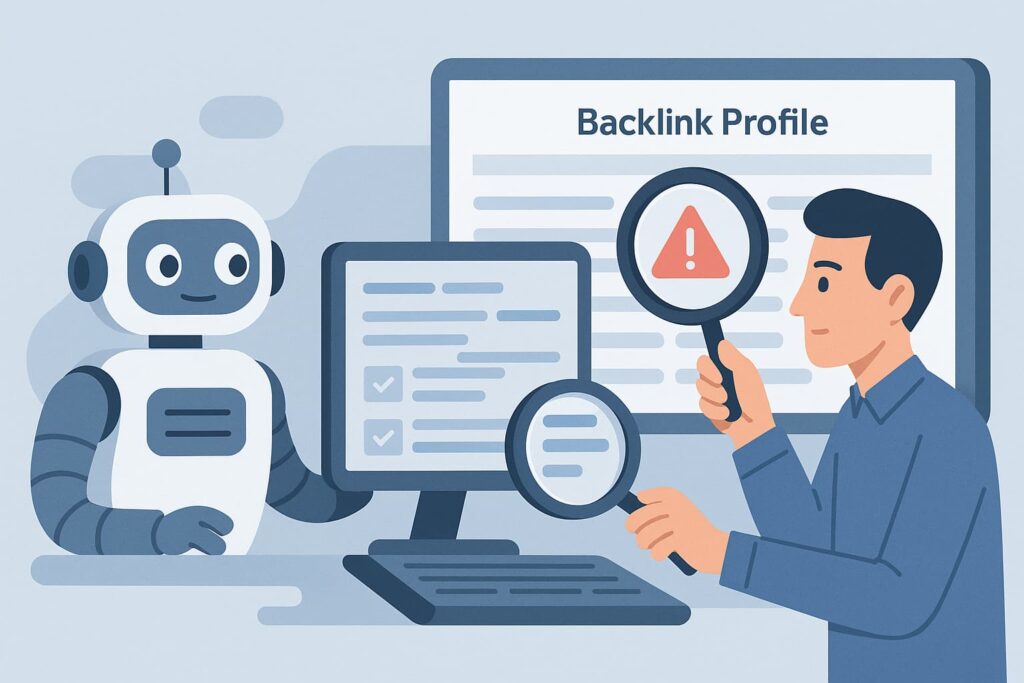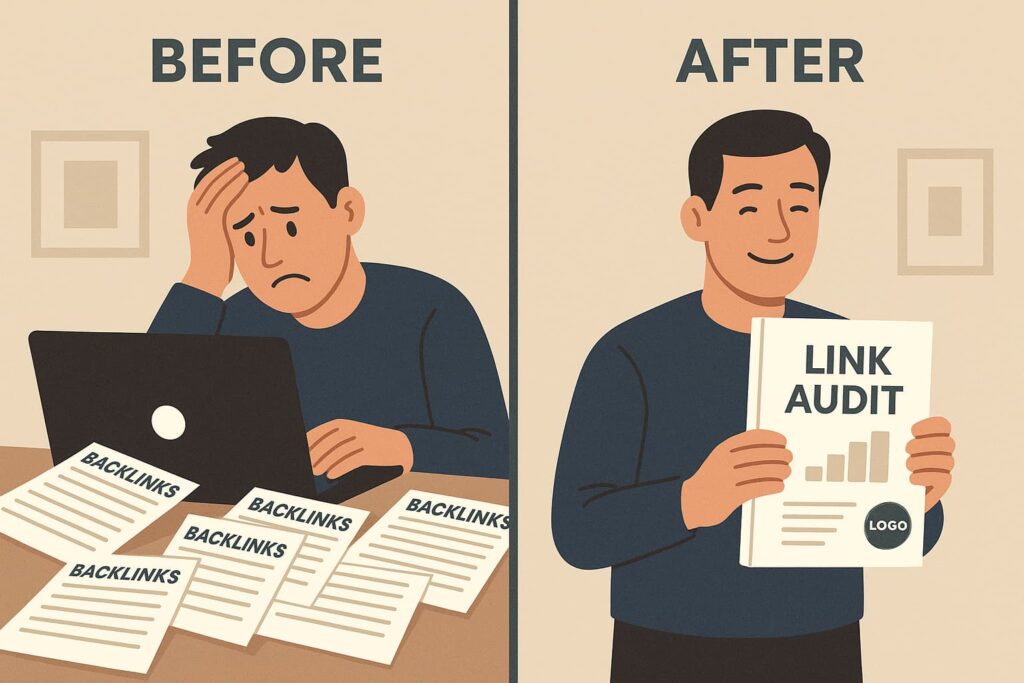Link building remains one of the most important aspects of SEO. However, not all links are equal—some help rankings, while others can harm a site. Many agencies and SEO professionals outsource link audits to white-label providers to save time and ensure accuracy. But are white-label link-building audit services really worth it?
What Is a White-Label Link Building Audit?
Think of it as having a backlink expert on standby. Instead of spending hours analyzing hundreds of links yourself, a specialized third-party does the heavy lifting for you. They’ll comb through every backlink, checking for red flags (like spammy or toxic links) while also highlighting the strong ones. The result? A clear action plan—knowing which links to ditch, which to keep, and where to focus your future efforts.
Here’s the best part: the whole audit comes branded as your work. Your client gets a polished, professional report with your logo—no clue it was handled behind the scenes. That means you can offer top-tier audits without expensive tools or hiring extra staff. It’s like having a secret SEO weapon.
Key Components of a Link Building Audit
A high-quality link building audit goes beyond a simple backlink count. It should provide actionable insights that help improve a site’s SEO performance. Here’s what a thorough audit should include:
1. Toxic Link Detection
Not all backlinks are beneficial. Some can harm a website’s rankings due to:
- Spammy links – From low-quality directories, link farms, or PBNs (Private Blog Networks).
- Penalized links – From domains that have been flagged or banned by Google.
- Irrelevant links – From unrelated niches, which provide little SEO value.
- Over-optimized anchor text – Excessive exact-match anchors can trigger algorithmic penalties.
A proper audit flags these risky links so they can be disavowed if necessary.
2. Link Quality Assessment
A real link quality check goes far beyond simply counting backlinks—it’s about identifying which ones truly impact rankings. The analysis begins with authority: links from respected, high-authority sites (measured by metrics like DA and DR) carry significant weight with search engines. These high-value links should be prioritized.
Anchor text distribution also matters—a natural profile includes a balanced mix of branded links, generic phrases, and some keyword-rich anchors, avoiding over-optimization of any single type.
The audit also examines link diversity, checking for various types such as press mentions, legitimate guest posts, strategic placements on relevant sites, and organic blogger references. This variety is crucial since obtaining links through only one method may appear suspicious to search engines. Proper analysis reveals which links genuinely support rankings versus those that could potentially cause harm.
3. Competitor Backlink Analysis
Want to know why competitors outrank your site? A competitor’s backlink analysis reveals the specific links they’ve secured that your site is missing. It identifies the exact guest posts, media placements, and resource pages driving their results, giving a clear roadmap to target similar high-value opportunities. No more guesswork—just actionable insights into which links truly impact rankings in your niche.
4. Actionable Recommendations
The audit should not just list problems but also provide clear next steps, such as:
- Disavow Requests – Which toxic links to submit to Google’s Disavow Tool.
- Link Removal Requests – Outreach to webmasters to remove harmful links.
- Link-Building Opportunities – High-quality sites to target for future backlinks.
- Content Gaps – Types of content that could attract more natural links.
Why Use a White-Label Link Building Audit Service?
For SEO agencies and digital marketers, conducting thorough link audits in-house can be resource-intensive. White-label services offer a practical solution by handling the technical heavy lifting while allowing agencies to maintain client relationships.
1. Saves You Hours of Grunt Work
Manually checking hundreds (or thousands) of backlinks for quality and risks is a huge time drain, especially for big sites. White-label services automate the heavy lifting with advanced tools, turning days of work into a fast, ready-to-use report. That means less time digging through data and more time for actual strategy and client growth.
2. Skip the Expensive Tools
Top-tier link-building audits need premium tools like Ahrefs or SEMrush—pricey for smaller teams. White-label providers already have these on deck and know how to use them right. You get deep insights (spam scores, anchor text trends, competitor gaps) without shelling out for subscriptions you’ll barely use.
3. Expertise Without Hiring
Not every agency has a dedicated link-building specialist on staff. White-label providers employ experienced analysts who understand Google’s guidelines, recognize toxic link patterns, and know which links actually help rankings. Outsourcing ensures professional-grade audits without the overhead of hiring another full-time employee.
4. Scalability
Growing agencies handling multiple clients need efficient ways to scale their services. White-label audits allow them to take on more work without increasing their team’s workload. Whether auditing five sites or fifty, the process remains streamlined, ensuring consistent quality across all reports.
5. Consistent Reporting
Clients want reports that are professional, easy to understand, and packed with actionable insights. White-label providers give agencies ready-to-use, branded reports, so every client gets a consistent, high-quality analysis without the guesswork of manual audits.
How to Choose a Good White-Label Link Building Audit Provider

Choosing the right white-label link audit provider makes all the difference—it’s what keeps your clients happy and your reputation strong. But with so many options out there, how do you pick the winner? You’ll want to look for these key differences that separate the ‘just okay’ services from the ones that actually deliver real value.
1. Manual Review Included
Automated tools can speed through backlink profiles, but they often miss the nuances that only a real person can spot. A good provider should pair tech with actual human analysis—catching sneaky red flags like shady linking domains, unnatural patterns, or industry-specific quirks that software might gloss over.
2. Clear Reporting
A great audit doesn’t just throw data at you—it gives you a clean, easy-to-digest report that both SEOs and clients can actually use. Look for reports that:
- Cut to the chase – Highlight the biggest risks and opportunities first.
- Explain clearly – No jargon, just plain-language insights.
- Prioritize next steps – Tell you what to fix now vs. later, so you can act fast.
The best reports save time and make strategy decisions a no-brainer.
3. Customization
One-size-fits-all advice doesn’t cut it in SEO. You need a provider that digs into what makes each client unique—their industry, objectives, and competitive landscape. The best analysts can spot niche-specific opportunities and know when certain links that might raise red flags elsewhere are actually golden in your client’s particular market. It’s about smart customization, not cookie-cutter reports.
4. Reputation and Track Record
Before choosing a provider, do your homework. Check their reputation in the SEO world by looking for:
- Real client feedback and case studies with actual results;
- Samples of their work (without breaching client privacy);
- Clear details about their team’s expertise and background;
- Proof they’re trusted by other agencies—ask for references if needed.
Look for a provider with real experience in link audits—not just one that offers it as a side service. A company that’s been around and specializes in this is usually a safer bet.
The best white-label providers act like part of your team. They match your quality standards while saving you time and effort. Do your homework upfront—it’ll save you stress later and help you deliver better results for your clients.
Example: 3XE Digital
One provider that meets these criteria is 3XE Digital, a trusted link-building audit service. They deliver practical white-label audits using both automated scans and manual review to catch issues that automated tools might miss.
Their reports pinpoint toxic links, recover lost backlinks, and reveal competitor gaps while providing clear fixes and improvement strategies.
Are White-Label Link Audits Worth It?

Most digital marketing agencies find white-label link-building audits to be a smart investment, as long as they’re working with a trusted provider that delivers real value. A solid link audit can save agencies tons of time while uncovering clear ways to boost their clients’ SEO. But here’s the catch: not all white-label services are the same. Picking the wrong one could mean getting low-quality reports that hurt your agency’s reputation instead of helping it.
Key Benefits of White-Label Link Audits
- Saves time – Running deep backlink checks in-house needs expensive tools and trained staff. Outsourcing lets your team focus on strategy and clients.
- Expert analysis – A good provider spots bad links, spammy sites, and missed opportunities, giving you more than just raw data.
- Keeps branding clean – White-label reports should match your agency’s look, making you appear professional and consistent to clients.
Potential Downsides of White-Label Link Building Audits
White-label link audits can be a game-changer for SEO agencies, but they aren’t perfect. It’s important to weigh the potential downsides—knowing what to watch out for helps agencies choose the right partner and set realistic expectations for clients.
1. Generic Recommendations
The problem with many white-label providers is that they rely on the same generic reports for every client. These reports often ignore key industry details, audience differences, or the client’s specific goals.
A truly useful audit should offer personalized insights—not just recycled data—to actually support the client’s SEO strategy. Otherwise, the recommendations might be useless—or even make things worse.
2. Cost Considerations
While outsourcing saves time, agencies must assess whether the expense is justified, especially for smaller clients. Pricing should make sense for both the agency’s margins and the value delivered. Some providers offer tiered plans, allowing flexibility based on audit depth.
3. Dependency on Third Parties
Relying on external providers means tying your agency’s reputation to their work. Poor-quality audits—like missed toxic links or shallow analysis—directly impact client trust. Mitigate this by vetting providers carefully: check case studies, client feedback, and quality assurance processes.
What Agencies Should Consider Before Choosing a Provider
To make sure you’re getting the best value for your investment, agencies should consider the following:
- Try a few providers first – Don’t commit to the first one. Test 2-3 to see who delivers the most accurate, detailed, and fast reports.
- Demand custom insights – Skip generic templates. The best reports are tailored to your niche, competitors, and link health.
- Price isn’t everything – Cheap options often cut corners with full automation. Slightly higher costs usually mean better quality.
- Look for bonus tools – Some providers include extras like disavow lists, competitor gaps, or monitoring—nice perks that add value.
Conclusion
White-label link audits pay off—if you pick a quality provider. A solid audit saves time, flags toxic links, and spots opportunities, letting you offer expert insights without extra costs. But avoid cheap, automated reports—opt for manual reviews with custom recommendations. The right partner boosts your SEO services; the wrong one risks client trust. Choose wisely to scale your agency effectively.